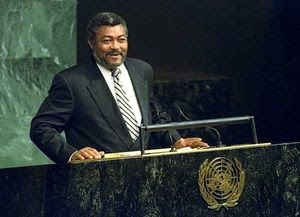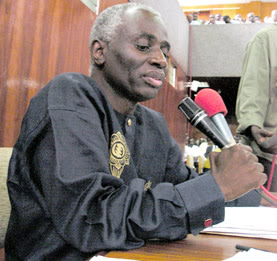
July 24, 2007 THE EDITOR THE STATESMAN P. O. BOX DTD 10 ACCRA
A REJOINDER "NORWEGIAN COURT SAYS: PRESIDENT RAWLINGS TOOK BRIBE PV OBENG ADMITS BUT CALLS IT CONSULTANCY" We act as Solicitors for Former President Jerry John Rawlings and his wife, Nana Konadu Agyeman Rawlings, whose attention have been drawn to the front page article in the Monday July 23rd, 2007 Edition of your newspaper with the headlines quoted above.
We believe you may have gathered your information from the same source that my clients have, that is, the 22 April, 2007 Edition of the Norwegian Newspaper, "Dagens Naeringsliv". If you did, then let it be said straight away that to the best of our clients’ knowledge no Norwegian Court has made any findings that either Former President Rawlings or his wife, Nana Konadu Agyeman Rawlings, took bribe from anybody. What you describe as the findings of the court were actually pieces of evidence given by a gentleman called Gerhard Heiburg. To the best of our clients’ knowledge, the findings made by the Norwegian Court were to the effect that it was difficult making any findings, in circumstances that were described by Gerhard Heiburg, that indeed the monies that were allegedly paid were indeed paid to and received by the recipients named by him. It was the newspaper that drew the conclusion that Mrs. Rawlings was the beneficiary of slush monies from Scancem. Your story, deliberately perhaps, failed to give a full background that led to the conclusions drawn by the Norwegian Newspaper.
Ownership of Scancem, manufacturers of cement, changed hands a few years ago. The new owners were concerned about the disbursement of certain funds by its previous directors in Africa towards consolidating their foothold in various markets in the region. To put it bluntly, these were bribe monies. The new owners took the view, after undertaking a thorough internal investigation, that contrary to what they thought, the monies, or at least substantial portions thereof, did not get to the intended recipients but had been stolen by Tor Egil Khelsaas, who was at the material time the Director in charge of African, and the one directly responsible for the disbursements. They therefore initiated a case against Tor Egil Khelsaas. It was in a bid to explain away what he did with the monies that evidence was given on behalf of Tor Egil Khelsaas by Gerhard Heiburg, mentioning names of persons that they alleged the monies had been paid to. Gerhard Heiburg was also implicated in the allegation of theft. It should be pointed out that none of the persons mentioned by Gerhard Heiburg appeared in court to deny or corroborate the evidence of Gerhard Heiburg. In the case of our clients, they were not even aware of the case until the Norwegian publication came out.
It was in these circumstances that the court took the view that the nature of the operations described by Gerhard Heiburg made it difficult for any findings to be made to the effect that indeed those monies had been given to and received by the recipients. That was the only reason why Tor Egil Khelsaas was let off the hook. Indeed it would have been an incredible feat of judicial reasoning for any court, particularly one situate in Europe, to have made findings of bribery against a former head of state and his wife without hearing any word from them and without their involvement whatsoever in the case.
It may interest you to now that the new owners have appealed against the judgment of the court of first instance, and that the matter is coming on for hearing on or about September 9, 2007.
It would appear that it was from the evidence of Gerhard Heiburg that the Norwegian newspaper decided to conduct their own investigations and then drew the conclusions that you have boldly quoted in your publication. We have also noted from your publication that Mr. P. V. Obeng was interviewed by the Norwegian newspaper. Strangely, though, the same courtesy was not extended to our clients, whom one might think would have been the real "scoop".
In specific response to your publication, we have our clients’ instructions to state as follows: To the best of their knowledge, no Norwegian court has made any findings to the effect that they had received any bribes from Scancem;
They are unaware of any secret account anywhere and indeed would welcome any information on the details of the accounts;
Our clients had never at any time asked for or received any monies whether directly or indirectly from Scancem in order to further their corporate objectives;
Former President Rawlings would like to state that the underlying yardsticks that informed the June 4, 1979 uprising that brought him to power, were integrity, dislike for corruption and the desire to improve the welfare of the ordinary Ghanaian. Those yardsticks were his guide throughout his almost two decades in power. He still lives by them. It would have been sheer betrayal of those who sacrificed their lives for the attainment of those goals for him to turn round and take bribe from anybody while in office. He would not have demeaned himself and what he stood for to that extent;
The Former President says further that he has had occasion to throw a challenge to the present government and to the world intelligence community to unearth any bank account that they may discover belonging to him into which he has paid stolen money.
To date, he has not received any response. The truth is that there is none. He would like to throw the same challenge to them and Transparency International (regarding the so-called secret accounts that are being mentioned in your publication in connection with him and his family), to conduct a thorough investigation if only to prove that they have at last got something against him. He would only ask for one indulgence: that they should make their findings public;
The final challenge, I am instructed to say, is to the present government, and I will very respectfully like to quote former President Rawlings: "Tell Ghanaians, tell President Kufour, tell the NPP Government, that at last they have got what they have been looking for for so long: some information that shows that I have stolen and hidden money, and that Jerry Rawlings is corrupt. Tell the President to get his Attorney General and all experts and financial wizards, and use all the diplomatic and political leverage that it has at its disposal, to investigate these allegations and prove that I am corrupt. And when they are ready, I will be ready too."
While the Former President and his wife are preparing an appropriate response to the Norwegian publication, they have instructed me to say as a general response to the allegations contained in the publication that they are wholly untrue and that they have absolutely no connection with Scancem and remain faithfully to their belief in the ability of the Ghanaian public to spot political mischief whether emanating from home or abroad.
On our part we hope, relying on Article 162(6) of the Constitution, that you would publish this rejoinder un-edited and would give it the same prominence you gave your own publication.
Yours faithfully Tony Lithur Cc 1. His Excellency Flight Lieutenant Jerry John Rawlings 2. Mrs. Nana Konadu Agyeman Rawlings
Source:Tony Lithur
 The Satellite Tracking System to monitor operations of transit vehicles would become fully operational by August 1, 2007, the Customs, Excise and Preventive Service (CEPS) said in Accra on Thursday.It said in a statement signed by Ms. Annie Anipa, Assistant Commissioner/Public Relations, that under the new system, which was in line with CEPS' modernisation and reform programme, devises, known as Satellite Tracking Units (STUs), would be attached to all transit vehicles to monitor their movement along the approved transit routes."Each transit vehicle will be required to attach a tracking unit to the roof of the vehicle using its magnetic mounting and wire strip," CEPS said."Vehicles without a normal horizontal metal roof will be required to have a horizontally welded metal plate of at least 25 cm x 25 cm attached to the top of the vehicles," it added. CEPS told transit vehicle operators that the attachment of an STU would be a pre-requisite for the vehicle to embark upon a transit journey through Ghana.It said the administrative fee per vehicle for the STU was GH=A2 50 (50,000 cedis), adding that any breach of the directive would constitute an offence punishable under the laws of CEPS. CEPS said with the operation of the Satellite Tracking System now in place, its transit escort would be disengaged from accompanying vehicles on their journeys.
The Satellite Tracking System to monitor operations of transit vehicles would become fully operational by August 1, 2007, the Customs, Excise and Preventive Service (CEPS) said in Accra on Thursday.It said in a statement signed by Ms. Annie Anipa, Assistant Commissioner/Public Relations, that under the new system, which was in line with CEPS' modernisation and reform programme, devises, known as Satellite Tracking Units (STUs), would be attached to all transit vehicles to monitor their movement along the approved transit routes."Each transit vehicle will be required to attach a tracking unit to the roof of the vehicle using its magnetic mounting and wire strip," CEPS said."Vehicles without a normal horizontal metal roof will be required to have a horizontally welded metal plate of at least 25 cm x 25 cm attached to the top of the vehicles," it added. CEPS told transit vehicle operators that the attachment of an STU would be a pre-requisite for the vehicle to embark upon a transit journey through Ghana.It said the administrative fee per vehicle for the STU was GH=A2 50 (50,000 cedis), adding that any breach of the directive would constitute an offence punishable under the laws of CEPS. CEPS said with the operation of the Satellite Tracking System now in place, its transit escort would be disengaged from accompanying vehicles on their journeys.










